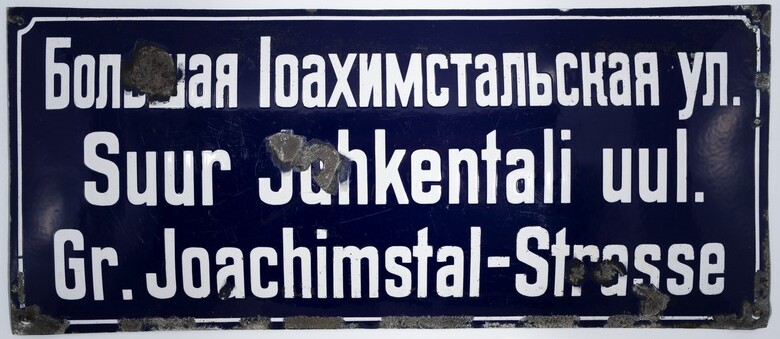Imperial Mirrors:
Streetscapes of the Romanov Empire, 1860s-1917
The naming and renaming of urbanscapes has never been a disinterested and easy matter; this process has always been part of structures and discourses of power and identity politics (Azaryahu 2009). As historians of the Habsburg Empire have recently shown, the reconfiguration of city space has also been linked to issues of regime change, nationalisation, memory, and commemorative practices (Palonen 2015; Rusu 2019; Berecz 2020, 2022; Reill 2020, 199). In the context of the Romanov Empire, however, the history of toponyms has not yet been viewed as part of its political history and historians of the empire have not paid much attention to it. Thus, with the exception of renaming streets in the Northwestern region of the empire after the Polish uprising of 1863–1864 (Staliūnas 2007), the history of urban toponymy of the empire was previously tackled only by regional historians, who did not pay much attention to the political context of this process, the rationale behind these decisions, their practical implementation, or how the population at large reacted to name changes (see for instance, Vladimirovich 2009; Päll 2009; Gorbachevich and Khablo 2006). During this workshop we would like to focus on the history of names of cities and towns as well as street names in the Romanov Empire in the second half of the nineteenth century. The participants will examine the palimpsest of toponymical practices involving not only different political, economic, and cultural spaces but also different languages. On the one hand, we would like to explore the process of the gradual politicisation of toponymic practices in late imperial Russia, its achievements, and failures. On the other hand, the history of toponymy of Romanov imperial cities merits attention as a way to study the extent of the empire’s penetration of everyday life of its inhabitants. The workshop aims to explore these issues from a broad geographical perspective, and especially welcomes contributions dealing with the Baltic provinces, western borderlands, Caucasus, Siberia, and Central Asia from the middle of the nineteenth century to the breakup of the empire.
17. April 2024
09:30–10:00 Introduction
Welcome:
Joachim Tauber (Nordost-Institut),
Anke Hilbrenner (University of Düsseldorf)
Introduction to the Workshop Theme:
Anton Kotenko (University of Düsseldorf),
Catherine Gibson (University of Tartu)
10:00–11:30
Keynote: “Street Names and the Politics of Identity”
Keynote Speaker: Maoz Azaryahu (University of Haifa)
Moderator: Anke Hilbrenner (University of Düsseldorf)
11:30–12:00 Break
12:00–13:00
Session 1: (Re)naming Streets in the Baltic Provinces
Chair: Joachim Tauber (Nordost-Institut)
Katja Wezel (University of Göttingen),
“A “German Colony” in the Romanov Empire? Assessing Riga’s Street Names through a Historical Lens”
Catherine Gibson (University of Tartu)
“Renaming in Name Only?: Residents’ Reactions to Toponymic Policies in Fin-De-Siècle Dorpat/Iur’iev”
13:00–14:30 Lunch
14:30–15:30
Session 2: Contested Toponymy in the Western Borderlands
Chair: Catherine Gibson (University of Tartu)
Darius Staliūnas (Lithuanian Historical Institute)
“Renaming of the Urbanscapes as Part of the Cultural Appropriation of Space in Late Imperial Russia: The Case of Vilnius”
Makary Górzyński (University of Kalisz)
“Contested and Negotiated Toponymy of Towns in the Polish Kingdom (1860s–1915)”
15:30–16:00 Break
16:00–17:30
Session 3: Imperial Naming Practices and Their Afterlives
Chair: Anton Kotenko (University of Düsseldorf)
Ulrich Hofmeister (UC Berkeley / LMU Munich)
“Empire on Site: Orenburg’s Toponymy Between the Local and the Imperial”
Aleksandr Turbin (University of Illinois at Chicago)
“The Policy of (Re)naming Streets in Vladivostok and Nationalizing Empire”
Ketevan Gurchiani (Ilia State University)
“Buildings and Places as Palimpsests in Tbilisi: Toradze Lane 3”
18:00–20:00 Conference Dinner
18. April 2024
09:30–11:00
Session 4: Streetscapes of the Center and Peripheries
Chair: Catherine Gibson (University of Tartu)
Anton Kotenko (University of Düsseldorf)
“Street Names as Means of Temporalization: Renaming the Urbanscape of Kyiv in the Late Nineteenth Century”
Sergius Ciocanu (Technical University of Moldova)
“Chisinau City Street Names in the 19th Century”
Yevhen Yashchuk (University of Oxford)
“Shaping and Maintaining the City-Text of the Provincial Center: Zhytomyr in the Second Half of the Nineteenth Century”
11:00–11:30 Concluding Discussion
The Workshop is a cooperation of Catherine Gibson (University of Tartu), Anke Hilbrenner (University of Düsseldorf), Anton Kotenko (University of Düsseldorf) and Joachim Tauber (Nordost-Institut).
Contact: anton.kotenko@hhu.de



